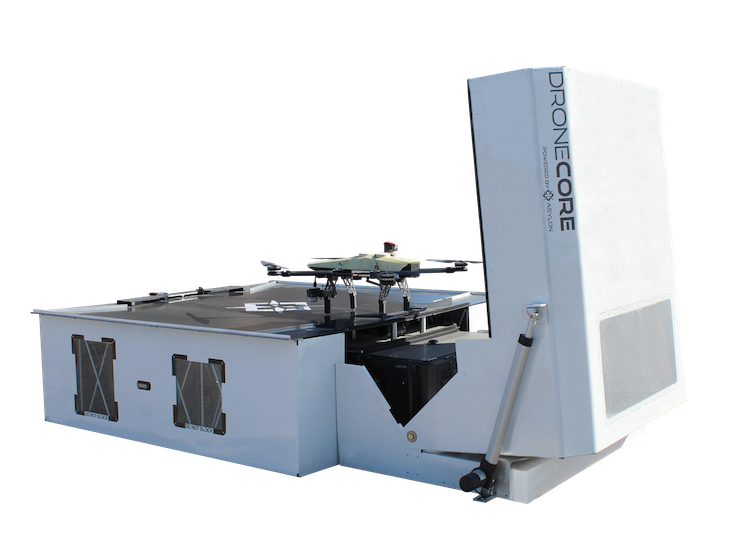
Asylon Robotics, based in Norristown, PA, has just joined an elite group of UAV companies offering companies “Drone in a Box” solutions for their industrial inspection needs.
The company has been working with the FAA for the past year to qualify its drone system for Beyond Visual Line of Sight (BVLOS) operations without the need for remote piloting or ground observers to ensure flight safety.
“This approval is the golden ticket of the industry, it is what every major player has been working towards,” Brent Mclaughlin, co-founder and COO at Asylon Robotics, said last week.
“The BVLOS waiver and removal of the need to have on-site personnel opens up our capabilities, flexibility, and ability to meet customer needs at the scale they’re requesting. This success is a testament to the Asylon team’s consistent delivery of 24/7 operations for our customers and our safety-first dedication.”
The Drone in a Box (DIB) concept has been around for some time, but cost and logistics have often hampered its adoption. DIB makes human intervention in drone management largely redundant. The system features a ground station that functions as a storage locker, launching pad and charging station all rolled into one. At previously scheduled times, or triggered by a ground sensor, the box opens up and a pre-programmed drone takes off on its appointed rounds – surveying a property (a farm, a mine, an industrial site, or bridge perhaps), inspecting site conditions, taking stock and inventory, analyzing possible crop stress or contamination – whatever might be required. The drone’s visual data is then relayed back to a central processing center – also operating autonomously – which reviews and analyzes it and presents it in the form of charts and graphs, which are then relayed to the site owner and his team for review.
Having completed its job, the UAV then returns to the ground station which opens its doors and puts the drone to bed for the night.
Israel-based Percepto is often credited with pioneering the DIB concept, and the company received its own BVLOS authority well over a year ago to begin conducting infrastructure inspections nationwide. Asylon’s niche innovation is to combine air and ground robotics into a single DIB system that is especially well-suited to perimeter and site security – or “patrol and report” – operations.
Asylon calls its tandem system DroneSentry/Drone Dog. One part is the drone in a box that can fly over a site with high-resolution zoom and thermal imaging cameras to identify trespassers, thieves and other potential threats. The other is a robotic “dog” on legs that can move in tandem with the drone and chase after and confront potential perpetrators, allowing security to apprehend them after detection. One of Asylon’s largest customers is the multi-billion dollar company GXO, which helps manage and protect industrial logistics worldwide. Thanks to Asylon, GXO will now manage one of the largest air and ground security robotics systems in the world, with well over 12,000 reported alarm response and patrol missions completed to date.
The FAA BVLOS approval makes it possible for Asylon to operate its DIB system with drone fleets covering large industrial sites, especially warehouses, and to manage the entire system from a single remote command center located thousands of miles away.
The competitive advantages of Asylon’s DIB system over more conventional security systems are hard to overstate. It’s costly to recruit, hire and maintain round-the-clock security personnel and guard dogs at multiple facilities, and high-trained intruders, including industrial saboteurs and even terrorists, have the potential to foil these human systems. Security work is also dangerous: companies can face significant liability from deaths and injuries that may occur to their security personnel during unauthorized breaches of their property. A completely automated DIB system like Asylon’s allows companies like GXO to reduce costs and exposure, while enhancing their ability to detect and deter possible threats to their industrial assets.
The global DIB market was valued at $990 million in 2022 but a four-fold increase to $3.5 billion is expected by 2030, reflecting a CAGR of 17.9%, according to Fortune Business Insights.
|